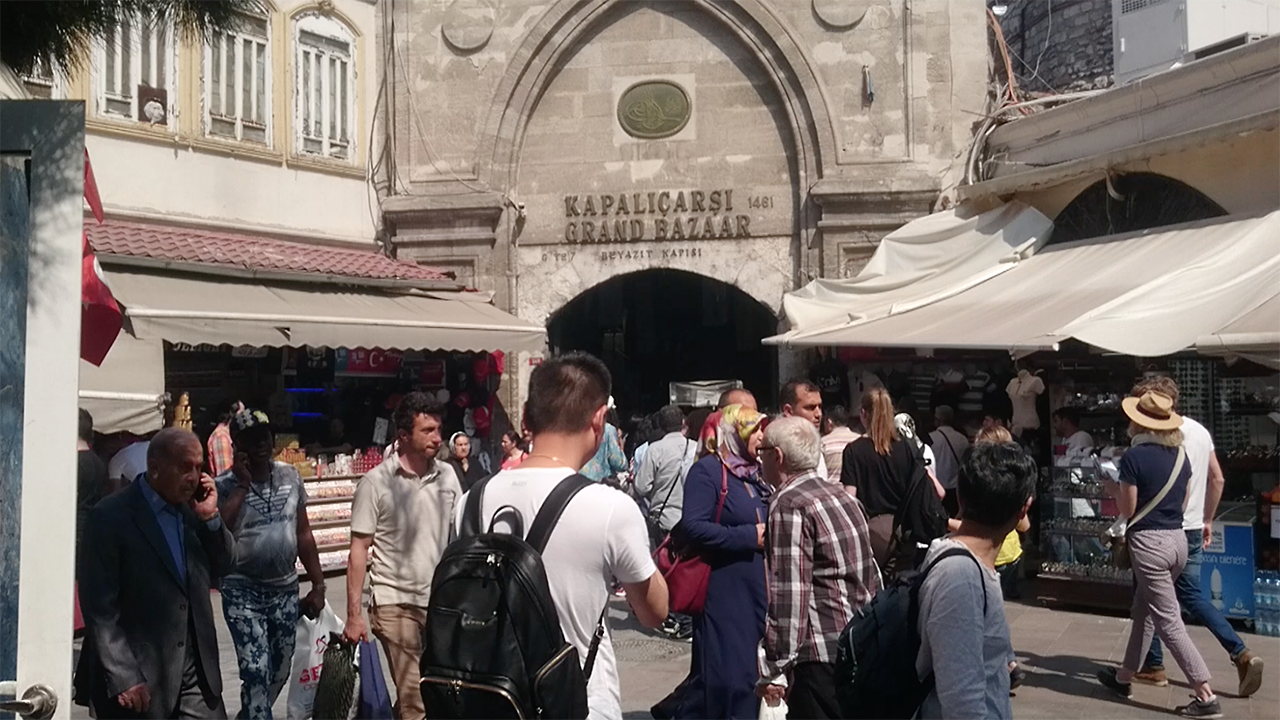The human face of
tourism in Istanbul
The individual stories of people who were
hit the hardest by Turkey's tourism fall
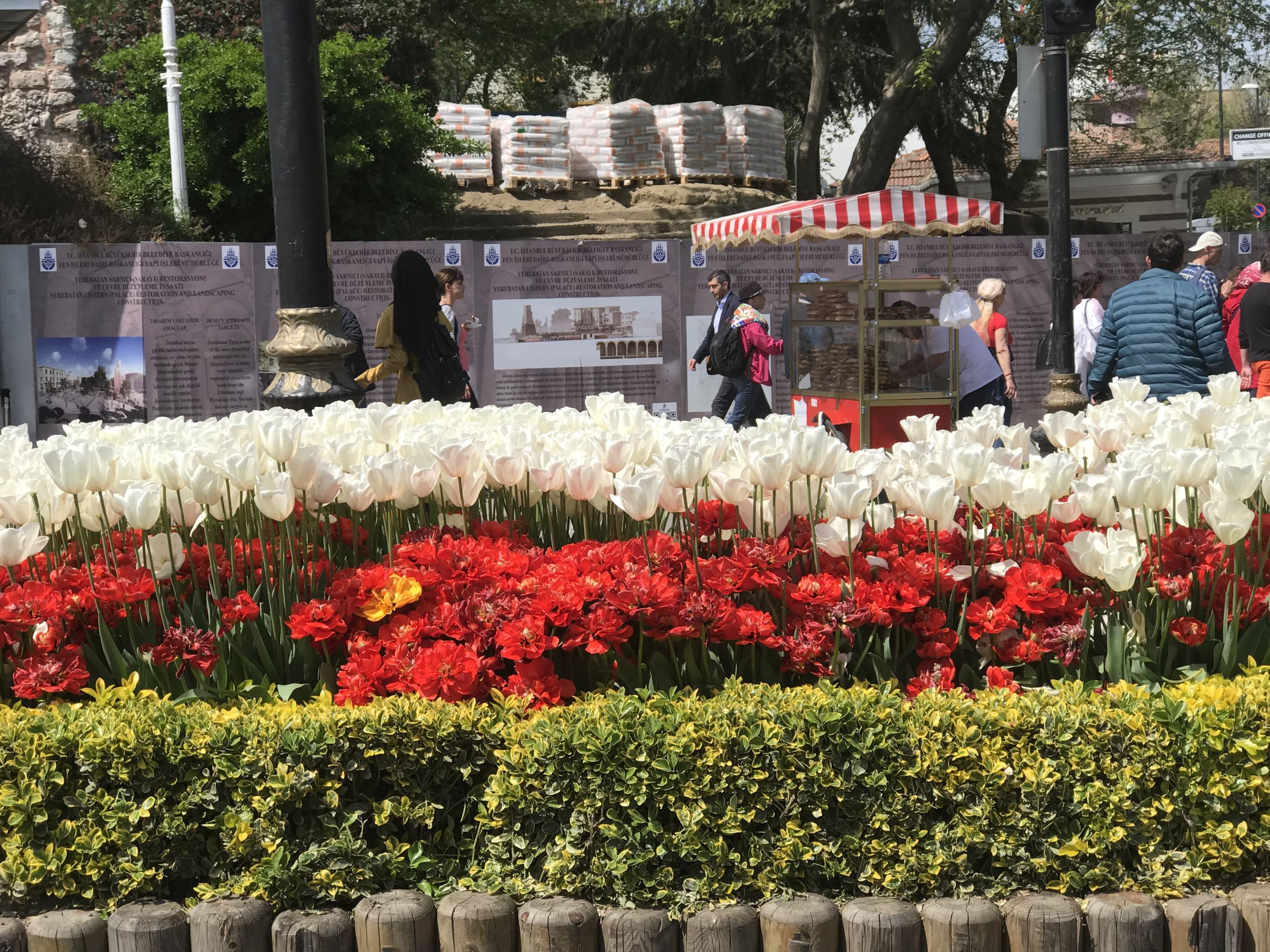
As I get out of the tram, I find myself right at the heart of the busy city of Istanbul. Right in front of me is the historic square of Sultanahmet, with the museum Hagia Sophia on my left and the Blue Mosque on my right. A long queue of visitors is waiting to enter the museum and street vendors are scattered all around the square selling roasted chestnuts, corn on the cob and rings of sesame-seed-covered dough, known as simit to local people. Small buffets in the distance offer traditional Turkish cooked food and fresh juices to its exhausted guests who have visited one museum after another since the early hours of the morning.
As the sun keeps warming up the stuffy air, people try to find a bench under the shadows of a tree. It’s very hot for the middle of April - nearly 30C today. In the middle of Sultanahmet square, tulips in all kinds of colours cover a 1,500-square-area for the annual tulip festival, forming a large flower carpet, surrounded by locals and tourists climbing up the ladder with the hope to take a good picture from above. The rest of the crowd here has a rhythm of its own and the hustle and the bustle of the city brings life to the city of Istanbul.
Over the last two years the megapolis has been rocked by terrorist attacks and the tourism industry has been significantly affected. According to Turkey’s Ministry of Culture and Tourism, between 2015 and 2016 there has been nearly a 25% drop in arriving visitors in the country. “We went through a very challenging period”, says Levent Polat, hotel manager at Hamidiye hotel. “Our tourist groups completely cancelled their bookings. Their flights were cancelled, the hotels remained empty.” After a number of terror attacks, a failed military coup and a nightclub shooting, many major parts of Istanbul turned into a ghost town, making people in the tourism sector pay the price.
I chat with Refika Turker, a Russian and Bulgarian tour guide who says, “People would not dare to come to Turkey a few years ago. Whether it involves business or not, the idea of coming as tourists to our country did not cross foreigners’ minds.
“Even me, as a Turkish citizen, was scared for myself and my family to get on the bus and go to crowded places. A foreigner would not dare to let their relatives visit either,” she added.
Now, the tourism industry seems to be making a slow but steady recovery. In 2017, the number of arriving foreign visitors reached nearly 32m with a 23% increase compared to the same quarter of the previous year. In an interview to Reuters, Turkey’s tourism minister, Numan Kurtulmus, says that this number will reach 38m in 2018, generating a revenue of $20 billion.
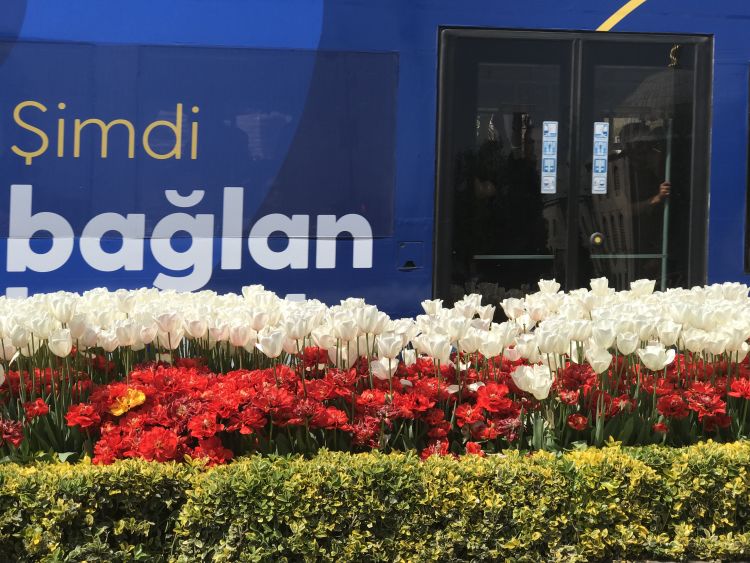
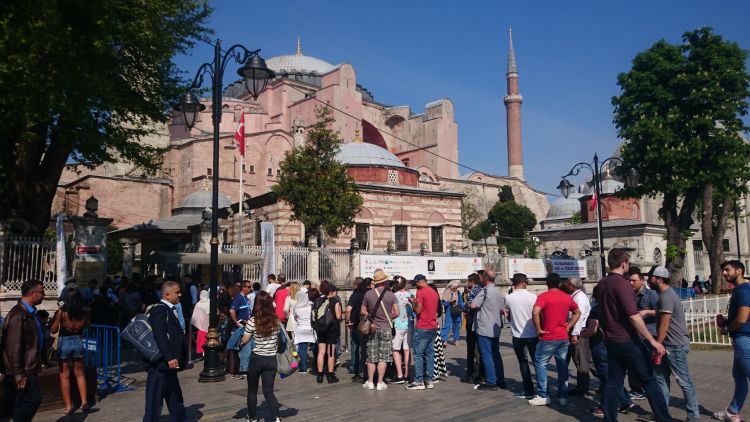
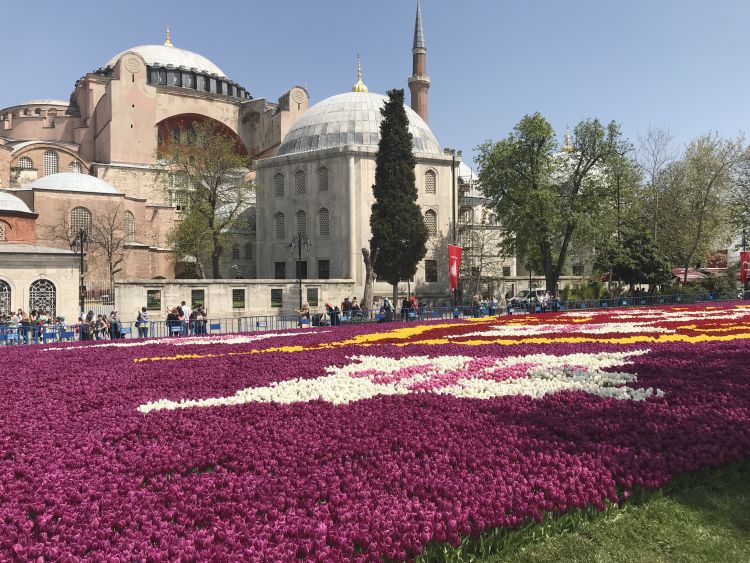
Currently, the UK Foreign and Commonwealth Office (FCO) advises against all travel to within 10 km of Turkey’s border with Syria and to the city of Diyarbakir in the southeastern area. Apart from these areas, all other cities in the country are safe to travel to and FCO advises to take care at all times and keep up to date with their travel advice.
The series of bombings affected all those people directly involved in the tourism sector - the people that make your stay pleasant in a foreign country. Many hotels had to let go of their staff, travel agencies bankrupted, restaurants and shops have been shut. With a large number of holidaymakers crossing Turkey off their travel plans, once successful tourism agents, hotel managers and business owners had to go through drastic financial losses. The significant fall in foreign visitors has put their businesses and livelihoods under threat.
What was it like through the eyes and lives of individuals who work in the tourism industry? It’s easy to get lost in statistics and the human face of tourism, as well as the social and economic influence the tourism sector has on their lives, often gets ignored and overlooked.
The individual voices
Refika has had a busy lifestyle working for a local council, doing guided tours in her free time and raising her children. The job she’s had as a tour guide for the last 25 years has been a good additional way to support her family. Before the tourism sector can revive completely from its current slump, its slow growth will continue to affect people who depend on it for income.
She says, “Because I was not making enough money as a tour guide, I could not afford shopping at my local market. In that matter, local shops’ profits went down as well. Everyone was affected.”
Many of Istanbul’s tour guides have been hit the hardest by the country’s tourism fall. Sevcan Demircan, a tour guide who works mainly with Russian and Bulgarian visitors, shares her own struggles with a hint of sadness in her voice. “I have not worked properly for the last two years”, she says. “Tourists from Europe used to be at the top in terms of tourism for us. Now they are at the bottom of the list.”
Sevcan says that the number of tourists from the Middle East have increased after the attacks but that has not been enough to revive the tourism sector. For her and other people in the industry, the return of Russian tourists this year is a ray of hope as they have been regular visitors and business clients for 25 years now.
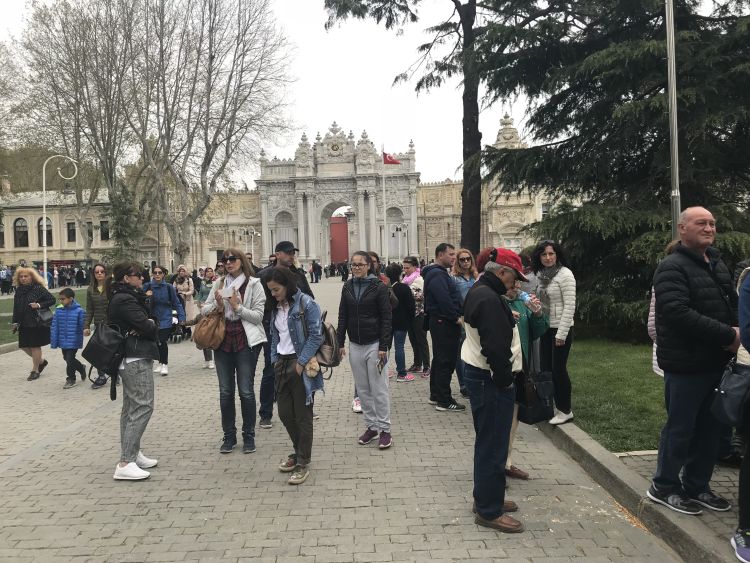
Slow progress
On a bigger level, many hotels in the central neighbourhood of Istanbul, Laleli, have turned into ghost places after remaining empty for a long time. The neighbourhood is completely built around tourism with hotels, boutique shops, restaurants and street vendors on every corner.
Levent says that the whole sector has gone through a great deal of shock. He can surely see a light at the end of the tunnel and hopes things will be much better this year. He says, “We have survived most of the troubles and we’ve managed to build trust again.
“We are making slow progress. Of course it’s not like before but these are small steps for us.”
Levent is delighted to share that regular visitors from Bulgaria, Macedonia, Serbia and Hungary are coming back this Spring for the annual tulip festival in Istanbul.
“We have received very good news this year,” he says with a smile on his face, “the Balkan countries have been a very big support to us so far.
“You have come and visited Istanbul now,” Levent says to me, “it's a safe place to stay as you can see.” He points out that such incidents can happen anywhere in the world, citing Paris airport and the Germany attacks.
When asked about his work in tourism, Levent says that tourists mean happiness for local people here. He and his staff are delighted to accommodate guests from foreign countries who come to learn more about the history and the culture of his country. With 15 years experience in his field, he has a positive outlook for the future of the tourism sector.
Mehmet Basank, hotel manager at Marmara Place Hotel, says that in comparison to previous years, business is going a lot better and they’ve been able to hire additional staff.
“In April we had 2,000 tourists only from Bulgaria,” Mehmet says. The hotel was forced to turn away potential guests when the 50-room hotel was fully booked.
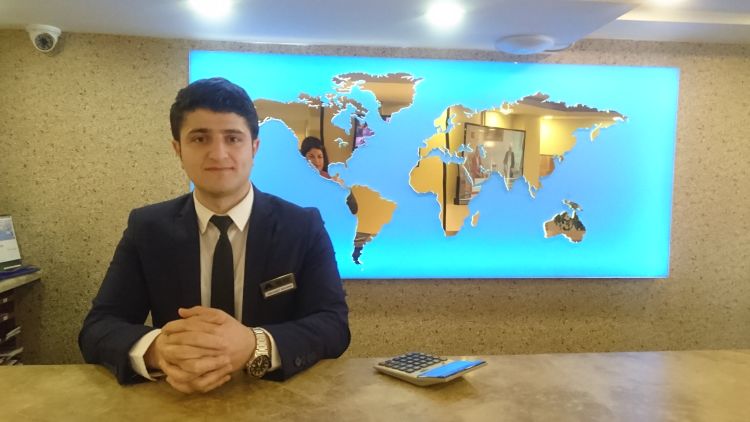
Mehmet Basank is a hotel manager at Marmara Place
Istanbul’s Grand Bazaar is one of the city’s best attractions for tourists, a covered market, popular with its shops for rugs, ceramics, Turkish delight and jewellery. In April, Grand Bazaar looks livelier than before - store owners hustling and bustling, apprentices offering traditional tea and a lot of shoppers choosing what to take back home. In comparison to tour operators, merchants say they were not heavily affected and their businesses are thriving with many more customers this year.
A sudden drop in tourist numbers can have a large effect on individuals whom depend on tourism as their main source of income. Local communities struggle the most and often their personal stories are left unheard in the face of national statistics.
Thus, as Turkey attempts to attract visitors back, the nation is working hard to preserve their country’s historical and cultural past and secure a stable financial future.
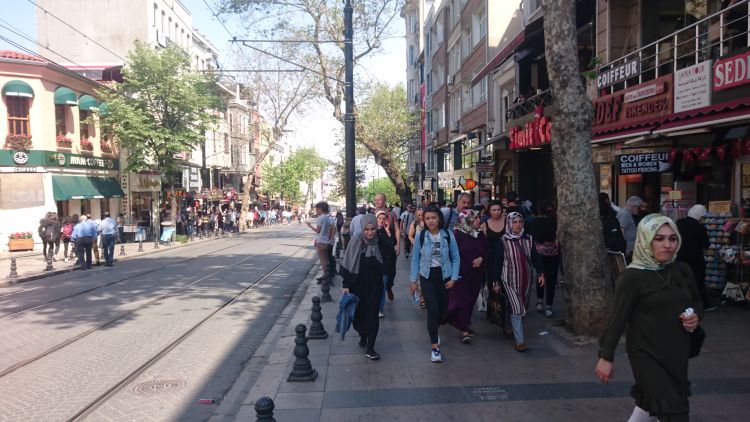
In 2017 there were 32m arriving visitors
In 2018 the number of visitors is set to reach 38m
